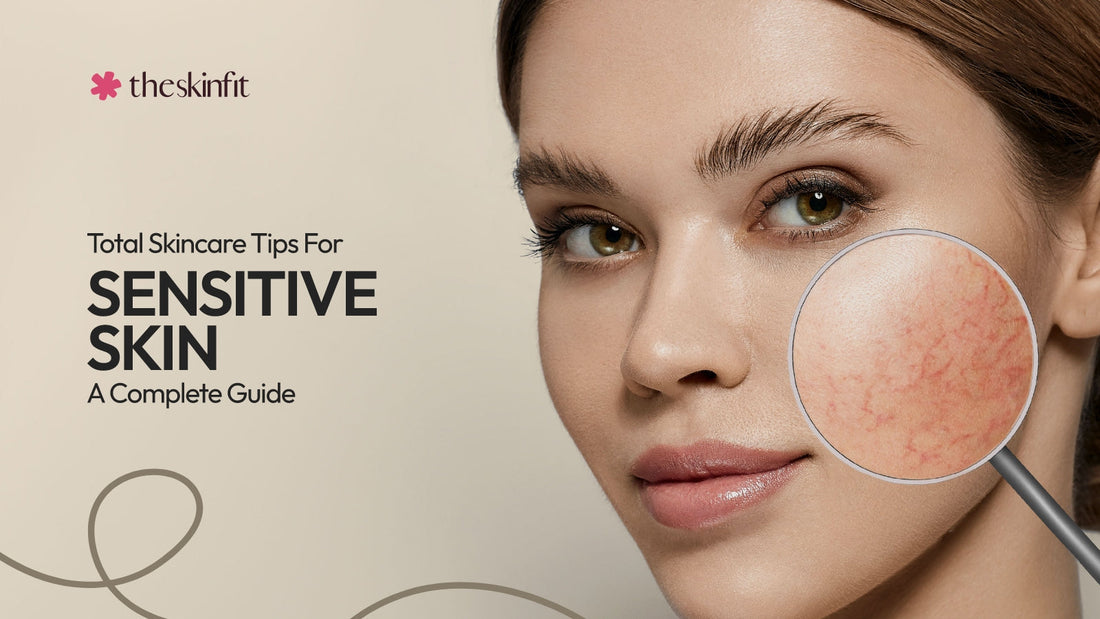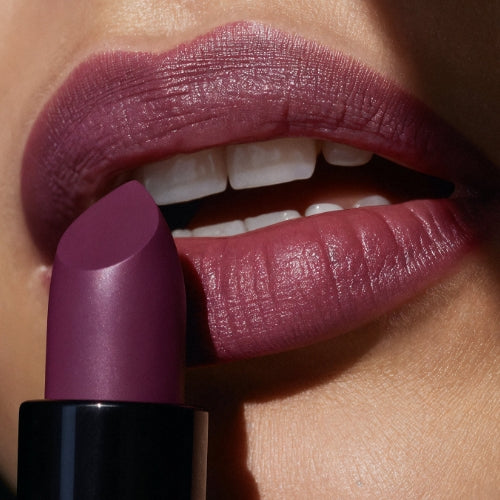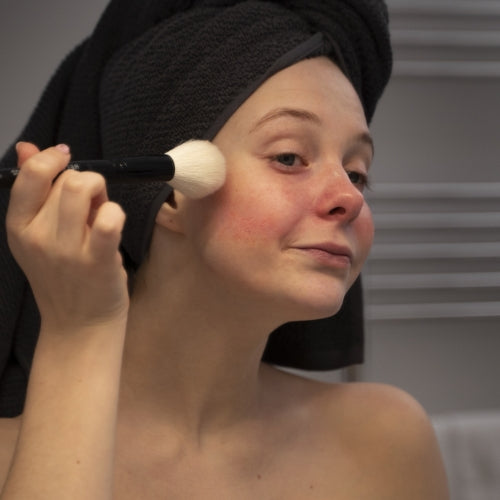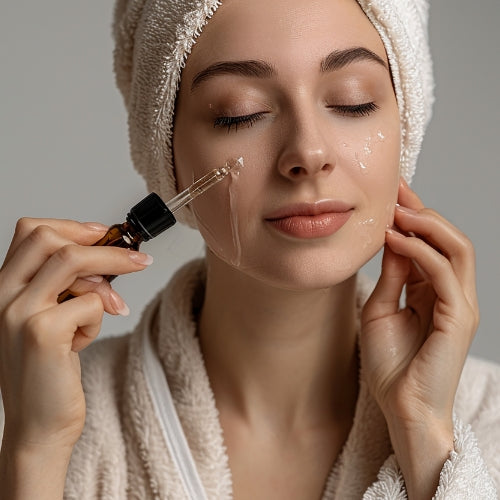
Total Skincare Tips For Sensitive Skin | A Complete Guide
Taking good care of sensitive skin is challenging, and keeping it beautiful is even more so. Sensitive skin can be prone to feel tight, itchy, and irritated. Things like pollution, temperature, food, and chemicals in some cosmetics can cause them.
Spring is the season of rebirth, so now is the perfect time to refresh your sensitive skin care regimen with a gentle facial cleanser, moisturizer, relaxing face mask, and other suitable products. We'll learn how to treat sensitive skin and get skincare tips in this post.
When dealing with sensitive skin, the less complicated the better. To protect your skin's natural pH balance, it's best to start with a cleanser that doesn't strip it of your skin's natural oils and moisture.
Here are some suggestions that can be helpful for sensitive skin to treat and prevent discomfort. You'll soon have healthy and bright skin.
Table of Contents
What Makes Sensitive Skin Different?
Compared to other skin types, sensitive skin is more likely to experience inflammation and other skin problems. Reasons why sensitive skin is different:
- Thin skin: Due to its fragility and sensitivity, irritation and other skin issues are more likely to occur in people with sensitive skin.
- Lack of protective barrier: The skin's protective barrier keeps environmental irritants out and moisture in. Sensitive skin has a poorer barrier, which makes it more prone to irritation and dryness.
- Overactive immune system: Sensitive skin with an overactive immune system may react more aggressively to irritants and products.
Understanding the characteristics of sensitive skin, as distinct from other skin types, will help you prevent irritation and other skin issues. This may include utilizing mild skincare products, sun protection, and avoiding harsh or fragranced products.
5 Useful Skincare Tips For Your Sensitive Skin
It's crucial to take additional precautions to prevent skin irritation and other issues. Here are some sensitive skin skincare tips:
- Use mild, non-abrasive cleaners: Harsh or scented cleansers can irritate delicate skin. Select a gentle, non-foaming cleanser that is free from sulfates, alcohol, and other irritants.
- Avoid hot water: Hot water can dehydrate and irritate the skin. Use lukewarm water to wash your face and follow with a cold rinse to tighten your pores.
- Select low-ingredient products, as many substances might irritate sensitive skin. Avoid scents, alcohol, and other irritants, and use simple products.
- Moisturizing helps keep your skin hydrated and reduces irritation. Use a sensitive skin moisturizer on wet skin to seal in moisture.
- Sun protection is crucial for sensitive skin. To keep your skin protected from UV rays, it is recommended to use a broad-spectrum sunscreen with an SPF 30 or higher.
The above tips can help you care for sensitive skin and maintain it in a healthy and attractive condition.
Skincare Routine For Sensitive Skin
A routine for sensitive skin should be mild and focused on nourishing and maintaining the skin. Here is a routine for taking care of sensitive skin:
- Cleanse: Use a mild, non-foaming cleanser to remove dirt, oil, and makeup. Avoid hot water and rinse well.
- Tone: To balance the skin's pH and eliminate pollutants, apply a toner. And make sure to avoid strong toners like alcohol.
- Treat: Use a spot treatment or serum for acne or dark spots. Check labels for sensitive skin products.
- Moisturize: To nourish and hydrate skin. Choose a fragrance-free and sensitive-skin moisturizer.
- Protection from UV Rays: Use a broad-spectrum sunscreen with at least 30 SPF. Especially when you're outside, reapply every two hours.
What Skincare Products Are Best For Sensitive Skin?
Choosing skin care products that are gentle and made for sensitive skin is essential. Here are some sensitive skin-friendly skincare products:
CeraVe Hydrating Facial Cleanser
Sensitive skin prospers with gentle cleansing. A non-foaming, sulfate-free cleanser like the CeraVe Hydrating Facial Cleanser is ideal. Ceramides and hyaluronic acid inside can cleanse your skin without stripping moisture, making it a dermatologist favorite for delicate skin.
COSRX Centella Water Alcohol-Free Toner
Toners should rebalance the skin without irritation. The COSRX Centella Water Alcohol-Free Toner is a standout, formulated with Centella Asiatica to soothe redness and hydrate without the use of alcohol or harsh additives. Its watery texture feels refreshing and never drying.
Anua Niacinamide 10% + TXA 4% Serum
Treatments for acne or pigmentation must be effective yet non-aggressive. The Anua Niacinamide 10% + TXA 4% Serum is the perfect choice. It brightens and refines texture with tranexamic acid and arbutin, while remaining fragrance-free and gentle enough for sensitive skin.
Beauty of Joseon Dynasty Cream
Daily hydration is non-negotiable. The Beauty of Joseon Dynasty Cream offers a luxurious blend of rice bran water, ginseng, and squalane. It deeply moisturizes while balancing oil and calming inflammation, making it perfect for sensitive skin that seeks a dewy glow.
Medicube Zero Pore Moisture Sun Serum SPF50+ PA++++
UV protection should never come at the cost of irritation. The Medicube Zero Pore Moisture Sun Serum SPF 50+ PA++++ delivers high protection with a serum-like texture. It's alcohol-free, non-comedogenic, and infused with hyaluronic acid and panthenol to provide hydration and soothing benefits.
How Can You Tell if Your Skin is Sensitive?
- If your skin gets itchy and gets irritated easily after using skincare products or coming into contact with certain chemicals, it may be sensitive.
- If your skin is prone to dryness and flakiness, especially when it isn't properly hydrated, you probably have sensitive skin.
- You are likely to have sensitive skin if your skin reacts severely to different skincare products. If you break out in a rash or develop hives after using skincare or cosmetics, it might indicate that your skin is too sensitive.
- You may have sensitive skin if you have a history of allergies or intolerance to specific substances, such as perfumes or preservatives.
If you suspect you have sensitive skin, it's recommended that you consult a dermatologist or other experienced skin care expert for a proper diagnosis and personalized advice on how to treat sensitive skin effectively. They can help you determine what triggers your sensitive skin and provide you with practical ways and products to manage it.
Conclusion
Caring for sensitive skin doesn't have to be complicated. With a proper skincare routine, gentle products, and a little consistency, you can maintain calm, clear, and healthy skin. From choosing fragrance-free cleansers to using moisturizers that lock in hydration without irritation, every step counts.
Remember, sensitive skin reacts quickly, so always patch test new products and avoid harsh ingredients. Whether you're dealing with redness, dryness, or breakouts, following these tips mentioned above can help you build a routine that can be ideal for your skin.
FAQ's
-
Is vitamin C good for sensitive skin?
Yes, but choose a gentle and low-concentration formula. -
What's not good for sensitive skin?
Avoid alcohol-based products, strong fragrances, harsh exfoliants, and essential oils. These can trigger redness, dryness, or breakouts on sensitive skin. -
Is vaseline good for sensitive skin?
In general, vaseline is safe. It protects the skin barrier and helps retain moisture, particularly in areas that are dry or irritated. -
Is niacinamide good for sensitive skin?
Absolutely, niacinamide is one of the best ingredients for sensitive skin. It can improve your skin's texture without irritating it, strengthen the skin barrier, and reduce redness.

















